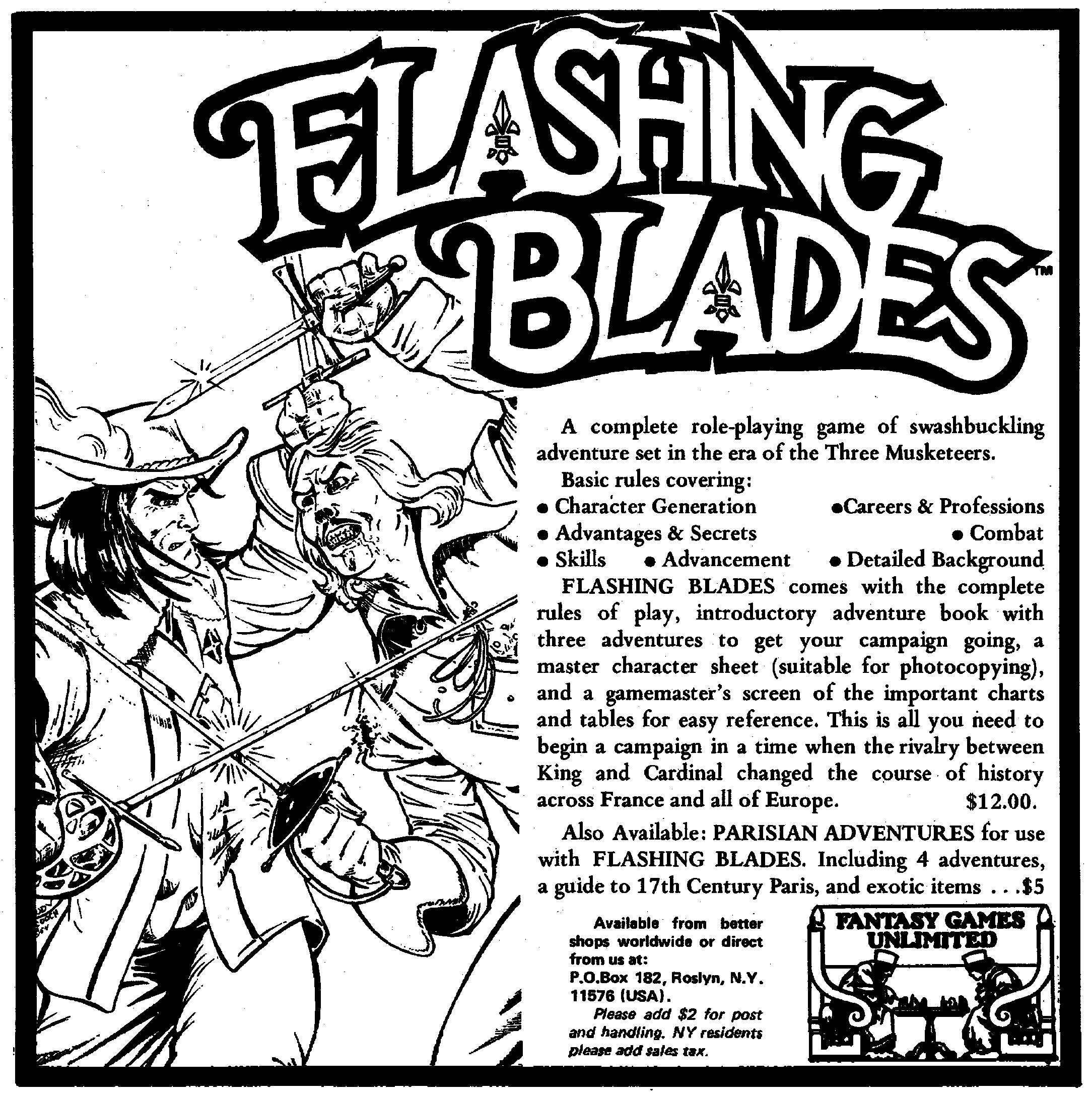Dueling aid for Flashing Blades
Use this dueling aid to track actions, defenses, and opponents, as well as to summarize dueling for the players.
I can remember seeing the Flashing Blades ad in Dragon back in the day and being fascinated by it. Two fencers angrily crossing swords in 17th century dress, it was such a cool illustration, especially for a Three Musketeers fan. But I never bought mail order at the time, and never ran across the game in person. I was reminded of Flashing Blades recently while visiting the Fantasy Games Unlimited web site for Daredevils information, which they also publish, and decided to try it out.
It’s the same price it was in 1984, albeit no longer as a boxed set.
I ended up running a session of it at the North Texas RPG Con, and it turned out to be even more fun than I expected it to be. I ran The Grand Theater from Parisian Adventure pretty much straight. While there is technically a reason for the characters to be there and a thing for them to find, it’s all really an excuse to get into duels with each other. It’s a great adventure for a convention one-shot.
Because it also contains some new items, a more detailed guide to Paris, and ideas for a sandbox campaign, I recommend Parisian Adventure as an essential supplement to Flashing Blades.
The hardest part of both times I’ve run The Grand Theater is that modern players don’t like to attack each other. They weren’t initially willing to get into duels with fellow players, despite that being upfront in the description of the session. Once one person broke the ice, however, it became a lot easier for others to join in the fun.
Flashing Blades is a weird game in that it’s going to be more fun if the duels are player vs. player rather than player vs. NPC, because that’s where the anticipation of duel tactics is going to be most interesting. A D&D-like game where the opponents are all handled by the GM isn’t going to be as much fun. But it’s still a role-playing game in that there are goals that are not rules-based, such as the recovery of naval documents. That, I think, is where the issue arose. Even with as flimsy a mission as “recover the stolen documents while embarrassing your opponents”, it was easy to focus on the “recover the stolen documents” to the detriment of “embarrassing your opponents”.
Flashing Blades simulates duels by having characters choose two actions secretly, one of which is likely to be an attack and one likely to be a defense. A dodge, for example, provides generally good bonuses against everything; a duck a great bonus against slashes, and a sidestep a great bonus against lunges and thrusts. If the defender also correctly guesses the kind of attack (assuming it’s a dueling weapon) that their opponent used, they gain a bonus to parry.
To make duels easier for players who likely had never played Flashing Blades before (and to make it easier for me to decipher who was doing what to whom) I made up a simple dueling aid (PDF File, 68.4 KB). Players in a duel, whether with another player or with an NPC, use this sheet to write down their two normal actions or one long action and their target, as well as circle their guess of what they might have to parry.
The sheet also summarizes the most common actions among the five types of actions. This is important because of the two basic rules of duels: choose two actions, but only one action from any one type. You can attack and defend, attack and counter, defend and counter, move and attack, and so on. But you can’t attack and attack or defend and defend.
The sheet also provides a very short summary of the dueling rules: what order actions are handled in and who gets to go first in any particular action.
Flashing Blade’s combat system is designed almost entirely around dueling. While non-dueling weapons can be used, they are basically handled as inferior dueling weapons. For example, while parrying a two-handed sword with a foil is likely to break the foil (a 5-in-6 chance) the person parrying with the foil gains not just a +2 to parry due to using a foil, but a +3 for guessing the type of attack (slash, thrust, or lunge) because the two-handed sword can’t do any of those. The two-handed sword exists in the limbo between dueling weapons and non-dueling weapons. It can be used to parry and can be parried against, but only attacks as a non-dueling weapon, that is, as a “strike”.

Illustrations (by Bain Sidhe Studio) are very good; some are amazing. I’d love to know where the original for this is today.
Initiative in Flashing Blades is also interesting, because it’s automatic, and that makes it a tactical decision as well. The order of actions in a duel follows a list of kinds of actions. Movement comes first, then attacks, then miscellaneous actions. Among attacks, missiles come first, then pollards, then dueling weapons, then other weapons, then unarmed attacks. Ties are broken first by dexterity, then by expertise, then by height1, and only then by rolling dice. In the games I’ve run so far, I don’t think dice were ever required to determine who went first.
Because I’ve only run one-shots so far, I don’t have a full understanding of how campaign play works. It looks as though it’s a lot of intrigue, jockeying for social and military rank, and for power within the clerical and royal bureaucracies.
Military campaigns are handled similarly to how En Garde handles it (rumor has it that En Garde inspired a lot of Flashing Blades). Success and failure of military campaigns are handled by a series of die rolls that, presumably, could be influenced by side-adventures that the characters take part in or by generic Brilliant Maneuvers.
One of the other interesting aspects of the game is that non-combat skills don’t have scores of their own; they use one of the character’s base attributes. Characters either have the skill, are a Master at the skill, or are Master Superior at the skill. Instead of bonuses or penalties, Masters and Master Superiors don’t have to roll under certain conditions. They’re automatically successful.
This was an incredibly fun game to play as a one-shot dueling game; I’d love to play an ongoing campaign of it.
Download the Flashing Blades dueling aid. (PDF File, 68.4 KB)
”Height” in Flashing Blades only comes in three categories: short, average, and tall.
↑
- Flashing Blades dueling aid (PDF File, 68.4 KB)
- Use this sheet to track attacks and defenses when characters are dueling each other or NPCs. Includes a quick summary of how to choose actions in Flashing Blades.
- Daredevils Detailed Action Time and Action Options Cube
- The Fantasy Games Unlimited game Daredevils, from 1982, has a very interesting combat turn system. Plus, an Action-Option cube you can assemble yourself!
- Fantasy Games Unlimited
- Aftermath, Bushido, Flashing Blades, MERC, Privateers and Gentlemen, Psi World, Space Opera, Swordbearer, and Year of the Phoenix, as well as Villains and Vigilantes adventures and other oddities.
- Flashing Blades: Mark Pettigrew at Fantasy Games Unlimited
- “It was a question of honor, and honor was always foremost in the minds of the men who strode through the age of the Sun King. A deserted courtyard on the edge of Paris was the stage on which they met with… FLASHING BLADES.”
- Flashing Blades at NTRPGC 2024
- I’ll be running a game of Flashing Blades on Wednesday at North Texas 2024.
- North Texas RPG Con
- “The NTRPG Con focuses on old-school Dungeons & Dragons gaming (OD&D, 1E, 2E, or Basic/Expert) as well as any pre-1999 type of RPG produced by the classic gaming companies of the 70s and 80s (TSR, Chaosium, FGU, FASA, GDW, etc). We also support retro-clone or simulacrum type gaming that copies the old style of RPGs (Swords & Wizardry, Castles & Crusades, and others).”
- Review: Flashing Blades: Jerry Stratton at Jerry@Goodreads
- Mark Pettigrew’s Flashing Blades is a grand example of the gems waiting in old-school roleplaying games.
- Review: Parisian Adventure: Jerry Stratton at Jerry@Goodreads
- Parisian Adventure is an essential companion to Flashing Blades. It contains great excuses for dueling as well as new equipment and more detailed locations.
More Flashing Blades
- Flashing Blades at North Texas, 2025
- I’ll be running Flashing Blades again at North Texas this year, in a game called l’Entreprenante l’Entreprenante, pitting 1705 Naval officers against 23rd century Mirror Universe Imperial Officers.
- Flashing Blades at NTRPGC 2024
- I’ll be running a game of Flashing Blades on Wednesday at North Texas 2024.

